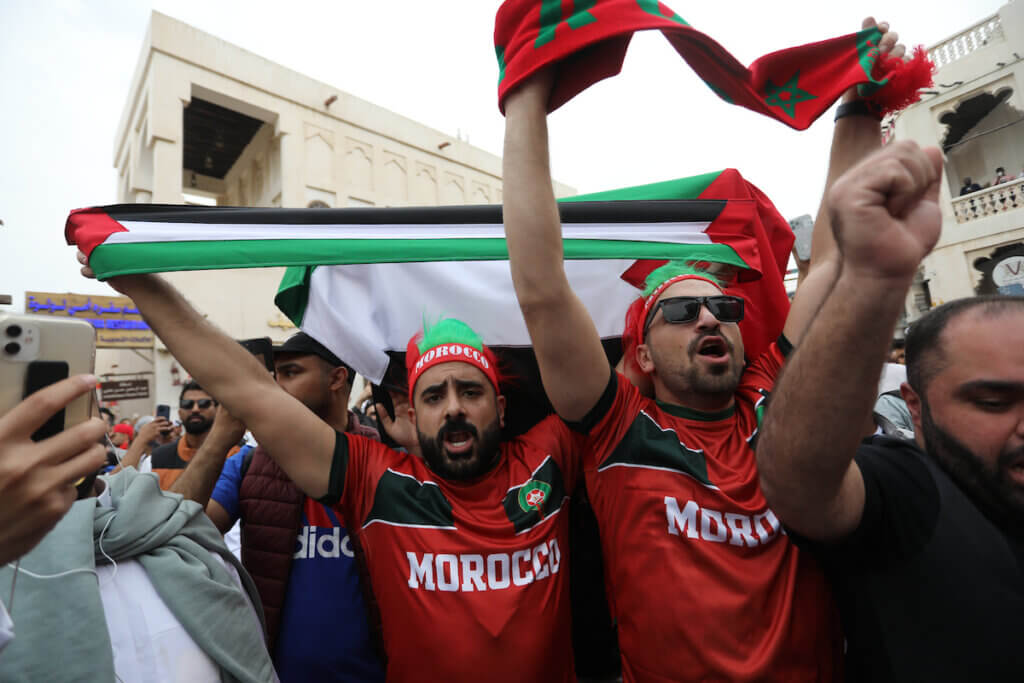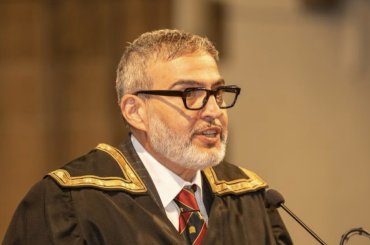“Caliphate Restored, Al Andalus is back,” a friend of mine posted on Facebook, a tongue-in-cheek reference to the reversal of colonial fortunes as Morocco defeated Portugal in last week’s World Cup match. Indeed, Morocco’s victory seems to have revived exultant anti-colonial defiance across the Arab World, as well as the African continent, and their diasporas. Fans of the first Arab and African team to advance to the semifinals were dancing in the streets of Rabat and Qatar, as well as former colonial centers such as London, Paris, Lisbon, and in multiple Latin American cities, where overjoyed crowds spilled into the streets, celebrating this momentous “first.”
Based on similar images, social media posts, and dances in the streets, there was yet another Arab winner at the World Cup 2022: Palestine, even though the beleaguered country isn’t playing. “Palestine Beats Israel on Football’s Big Stage.” “The World Cup Isn’t Over Yet, But Palestine Has Already Won.” These headlines, and there are many more, are indicative of the overwhelming joy Palestinians and their allies have experienced at the sight of the abundance of Palestinian flags, armbands, and bracelets, and the chants of “Free Palestine” at the stadiums and fan zones in Qatar, as well as in media coverage of the sports event. Morocco’s victory over Portugal, and the Moroccan players defiantly displaying the Palestinian flag alongside the Moroccan one, was the cherry on top. Gone is the taboo around support for Palestine at sports events, which for so long claimed to be “apolitical,” when of course they are nothing if not political. Because everything is political, and because these are national teams competing, regardless of the nationality of the players, and nationalism is political.
Yet away from the loud cheers and zaghroutas for Morocco, and the rejoicing over the boisterous popular support for Palestine in Qatar and elsewhere around the globe, are the semi-hushed but critically important discussions over the colonial nature of Morocco, which has been occupying, oppressing, and exploiting Western Sahara for decades.
Certainly, the similarities between the plight of that occupied, annexed African territory and Palestine are uncanny. Like Palestine, the Western Sahara was occupied by a European power (in this case, Spain) which, upon leaving the territory, arranged for it to come under the control of another party, in this case, Mauritania and Morocco. Mauritania dropped its claim to the Western Sahara in 1979, even as Morocco was tightening its grip on the non-sovereign territory. Today, Morocco operates a settler economy in the Western Sahara, and has been channeling phosphates from the Bou Craa mine into Morocco, on the world’s longest conveyor belt, so long it is visible from space. Bou Craa is one of the largest phosphate mines in the world, and the West Sahara Resource Watch explains that while West Saharan phosphates significantly enrich Morocco, their extraction and exploitation by Morocco sinks the Sahrawi people further into poverty. The (pro-government) Morocco World News reports that Morocco’s phosphate reserves account for over 70% of the world’s phosphate supply, without indicating that these reserves lie primarily in Western Sahara. Morocco also exploits West Sahara’s maritime coast, selling its fish to European countries, in violation of the Geneva Conventions. The United Nations has been trying to negotiate an agreement between the two parties, and has issued a General Assembly resolution in favor of decolonizing Western Sahara annually since 2008. Meanwhile, Moroccan settlers work at the Bou Craa mine, and European countries normalize this illegal extraction by buying phosphates from Morocco, or providing their engineering and technological expertise to Morocco.
Another similarity with Palestine hinges on the important concept of indigeneity, and indigenous sovereignty and belonging to the land, rather than owning it. Specifically, the Sahrawi people are nomadic, a mix of Berbers, Black Africans, and Arabs, who have long called the Western Sahara home, even as they historically roamed the region, rather than built cities. One immediately thinks of the Bedouin who have long called the Naqab home, and whose villages Israel refuses to recognize, and is determined to raze, again and again.
During the 1980s, the Polisario Front, West Sahara’s politico-military organization which first formed to seek independence from Spain, but is now seeking independence from Morocco, launched a number of attacks on Moroccan outposts in Western Sahara, following which Morocco erected a wall in the desert, which in some places extends into internationally recognized Mauritanian territory. The wall, which was completed in 1987, was built with help from Israeli advisors, and annexes Western Sahara’s capital city, as well as the Bou Craa mine.
The above barely scratches the surface of the similarities between the Western Sahara and Palestine, and reveals Morocco, the “former colony,” to be an oppressive colonial regime today. This explains, to some extent, the normalization agreement between the kingdom of Morocco, and Israel. Meanwhile, the Palestinian Front for the Liberation of Palestine has long uplifted the Sahrawi’s independence struggle, and supported the Polisario.
The “normalization” between Morocco and Israel, however, does not trickle down to the Moroccan people, who obviously embrace the Palestinian people and our struggle. This was made crystal clear in the victory chants of the Moroccans, and their joyful displays of the Palestinian flag.
So yes, we can rejoice for Morocco, the team of players who catapulted Africa and the Arab World into World Cup History. But the reality is that, if we support Palestine, we must support the Sahrawi people’s struggle for liberation. That doesn’t mean not rooting for Morocco at the World Cup, this is not a zero-sum game. But it does mean we need to bring up Western Sahara, because if anything, the media blackout of the Sahrawi struggle has been even more hermetic than the censorship of the Palestinian narrative. And now is as good a time as any to chant “Free Palestine, Free West Sahara,” and “Go Moroccooooo!”



“Because everything is political, and… nationalism is political”.
______________________________________________________________
Success in politics, largely a function of public opinion.
Author Nada Elia is exactly correct. To induce Morocco in 2020 to sign onto the so-called “Abraham Accords” normalizing relations with Israel that were hatched by Jared Kushner, who is Trump’s son-in-law and a rabid Zionist, Trump bribed the Moroccan government by allowing it to annex the disputed Western Sahara. As Nada Elia points out, in Western Sahara reside the long-oppressed Sahrawi people, who now face even more oppression and exploitation under Morocco’s strongman prime minister, Aziz Akhannouch. So yes, we should root for Morocco in the World Cup, while being aware that Morocco is not a democracy, and if it were, Moroccan citizens would never have accepted Trump’s and Kushner’s bribe to cozy up to Israel by selling out the Sahrawis, whose plight is very similar to that of the indigenous people of Palestine.
Indeed. I 100% support the Moroccan people, but not the evil regime that rules over them which pretends the zionist entity is a real nation.